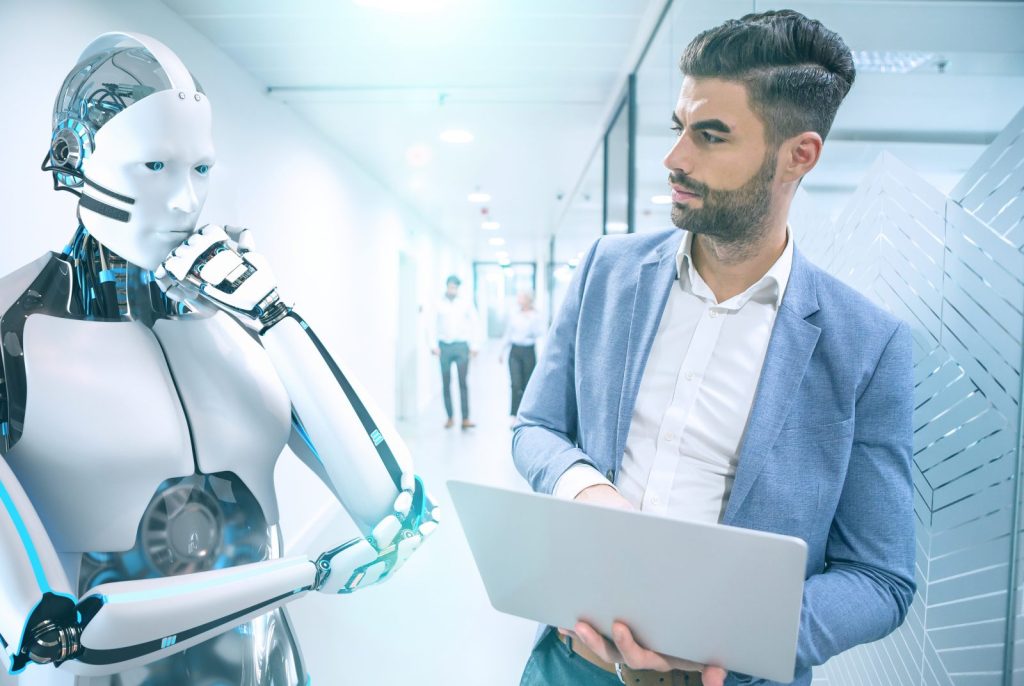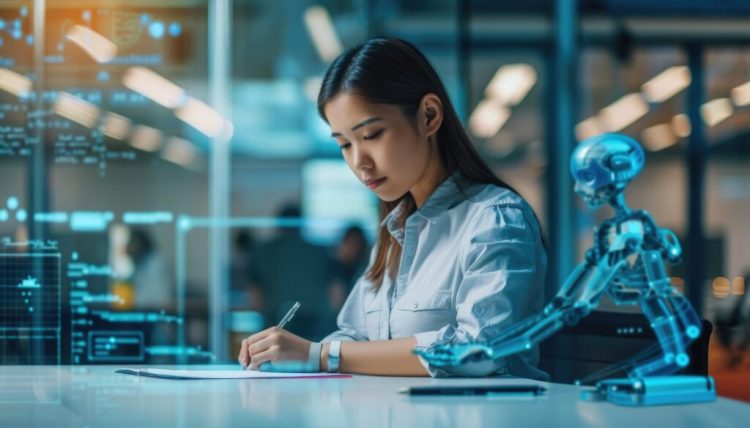Introduction:
Artificial Intelligence (AI) is increasingly becoming a transformative force, shaping not only technological innovations but also redefining the structure of the modern workplace. From automated tasks and enhanced productivity to the potential displacement of certain jobs, the impact of AI on the future of work is profound and multifaceted. As AI technologies evolve, industry leaders, economists, and experts in the field are offering diverse perspectives on how AI will affect jobs, workplace dynamics, and employment opportunities in the years to come.
In this article, we delve into the viewpoints of some renowned experts who have studied AI’s implications on the workforce. We will explore their predictions, concerns, and suggestions for how businesses and employees can prepare for an AI-driven future. By understanding these perspectives, we can better navigate the inevitable changes and challenges brought by AI while leveraging its potential for positive transformation in the workplace.
1. The Role of AI in Transforming Job Functions: Expert Insights
AI’s ability to automate tasks and process data has raised questions about its role in changing job functions across industries. Some experts argue that AI will eliminate certain types of jobs, while others emphasize its potential to create new opportunities by reshaping how work is done.
1.1. Dr. Kai-Fu Lee: AI as a Job Creator, Not Just a Job Killer
Dr. Kai-Fu Lee, a leading AI expert and the author of AI Superpowers, provides a nuanced perspective on AI’s impact on jobs. According to Dr. Lee, while AI will undoubtedly displace certain jobs, particularly in industries like manufacturing, retail, and transportation, it will also create a new wave of employment opportunities in fields such as AI development, data analysis, and machine learning.
Dr. Lee highlights that jobs that involve repetitive, predictable tasks are at high risk of automation. However, jobs requiring creativity, empathy, and complex decision-making are less likely to be automated, and may even see greater demand due to AI’s ability to handle more mundane aspects of work. For example, healthcare professionals, educators, and creative workers will likely see their roles evolve, but their core functions will remain indispensable as AI handles routine administrative tasks or provides advanced decision support.
1.2. Andrew Ng: AI as a Tool for Augmenting Human Work
Andrew Ng, a renowned AI researcher and co-founder of Google Brain, emphasizes that AI should be viewed primarily as a tool to augment human capabilities rather than replace workers altogether. He argues that the future of work lies in human-AI collaboration, where AI enhances productivity by assisting with data processing, decision-making, and repetitive tasks, allowing human workers to focus on higher-level, more strategic activities.
Ng believes that, as AI automates more routine tasks, employees will need to adapt by developing new skills that complement AI systems. For instance, workers might move into roles that require them to manage AI systems, interpret complex data, or apply AI-generated insights in creative and strategic ways. In industries like education, customer service, and healthcare, AI has the potential to elevate workers’ ability to provide personalized, high-quality services by handling administrative burdens and offering data-driven recommendations.
2. AI and the Rise of Remote Work: Perspectives from Industry Leaders
AI’s role in the workforce is not just about automation—it’s also reshaping where and how people work. Remote work, a trend accelerated by AI tools, has become a significant part of the future of work, especially in a post-pandemic world.
2.1. Dr. Tom Davenport: The Role of AI in Enabling Remote Work
Dr. Tom Davenport, a leading expert on AI and business innovation, underscores how AI-powered collaboration tools have facilitated the rise of remote work. From virtual assistants that schedule meetings and manage tasks to AI-driven communication platforms that analyze team performance and enhance productivity, AI is enhancing the remote working experience.
Davenport predicts that as AI technologies continue to evolve, workers will have more autonomy to manage their schedules, tasks, and workflows. AI will act as a personal assistant, helping employees balance work-life commitments by managing their time and communications. Additionally, AI’s ability to assist with information retrieval, task automation, and real-time feedback will help employees work more efficiently without the need for physical office space.
However, Davenport also highlights that there are concerns related to the remote work revolution, such as employee burnout, the potential for social isolation, and the challenge of maintaining organizational culture. The widespread use of AI to monitor employee performance remotely could lead to privacy concerns and trust issues. Balancing AI’s role in enhancing productivity with the need for human connection and well-being will be a key challenge for businesses in the future.
3. AI and Upskilling: The Need for New Competencies in the Workforce
As AI reshapes job roles, there is a growing emphasis on the need for employees to develop new skills. Experts agree that adapting to the AI-driven workplace will require a focus on upskilling and reskilling workers to remain relevant in the job market.
3.1. Garry Kasparov: Human Intelligence and Emotional Skills in the Age of AI
Former world chess champion and AI advocate Garry Kasparov believes that AI will never replace the uniquely human qualities of creativity, emotional intelligence, and ethical decision-making. He argues that the future workforce will need to focus on these aspects of human intelligence, which AI cannot replicate. Kasparov advocates for integrating emotional intelligence and soft skills into the workforce development agenda, especially as AI tools increasingly handle technical and cognitive tasks.
In his view, while AI excels at analyzing data and making recommendations, it cannot engage in empathy-driven interactions or navigate the complexities of human relationships. As a result, jobs that require interpersonal communication, leadership, and creativity—such as those in management, healthcare, education, and entertainment—will continue to be valuable, even as AI automates more technical and administrative tasks.
3.2. Daron Acemoglu: The Need for Policy and Education Reform
Daron Acemoglu, an economist at MIT and a leading scholar on the economics of AI, warns that while AI has the potential to create new jobs, it may also exacerbate inequalities if its benefits are not broadly distributed. He argues that the key to navigating the future of work in an AI-driven world is a focus on education and policy reform. Governments, businesses, and educational institutions need to collaborate to ensure workers are equipped with the skills necessary to thrive in the evolving economy.
Acemoglu advocates for a shift in educational priorities, emphasizing STEM (science, technology, engineering, and mathematics) education, along with critical thinking, problem-solving, and collaboration skills. He stresses that it’s not just about technical expertise, but also about cultivating workers who can navigate complex, unpredictable work environments where AI is one tool among many.

4. AI’s Impact on Job Displacement and Income Inequality
While experts agree that AI will generate new opportunities, many also caution about the negative effects it may have on job displacement and income inequality.
4.1. Erik Brynjolfsson and Andrew McAfee: The “Second Machine Age”
In their influential book, The Second Machine Age, Erik Brynjolfsson and Andrew McAfee explore how technological advancements, including AI, will bring about a new wave of economic change. They argue that AI-driven automation will result in job displacement, particularly for workers in routine, manual, and low-skill positions. However, they also believe that AI can be a driver of economic growth if managed properly.
Brynjolfsson and McAfee suggest that while automation may reduce the number of low-skill jobs, it will also create new, high-skill roles in fields like data science, AI programming, and robotics engineering. They call for policies that help workers transition to these new roles through retraining programs and universal basic income (UBI) as a way to mitigate the negative effects of job loss.
5. The Ethical Considerations of AI in the Workforce
As AI becomes an integral part of the workplace, there are significant ethical considerations regarding its deployment and impact on workers.
5.1. Shoshana Zuboff: Surveillance Capitalism and Worker Rights
Shoshana Zuboff, a professor emerita at Harvard University and author of The Age of Surveillance Capitalism, warns that AI, if used irresponsibly, could exacerbate issues of surveillance and worker exploitation. Zuboff is concerned about the rise of “surveillance capitalism,” where AI-powered tools are used to monitor and control workers, often without their knowledge or consent.
She argues that businesses must be transparent about how AI systems are being used in the workplace, especially when it comes to monitoring employees. Zuboff advocates for strong data privacy regulations and ethical guidelines for AI deployment to ensure that workers’ rights are protected, and that AI is used in a manner that supports, rather than undermines, their well-being.
6. Conclusion: The Future of Work in an AI-Driven World
The perspectives of leading experts on AI and the future of work highlight a variety of viewpoints on how AI will reshape the workplace. While AI has the potential to automate routine tasks and enhance productivity, it also brings challenges such as job displacement, ethical concerns, and the need for upskilling.
Experts agree that businesses, governments, and educational institutions must work together to ensure that workers are equipped to adapt to an AI-driven world. By focusing on education, ethical AI deployment, and policy reform, societies can harness the benefits of AI while minimizing its negative impact on employment and income inequality.
The future of work will be shaped by how we choose to integrate AI into our organizations and our lives—using it as a tool to augment human intelligence, not replace it. With the right strategies and policies in place, AI can be a force for good, unlocking new opportunities and helping workers and businesses thrive in an increasingly AI-powered world.











































